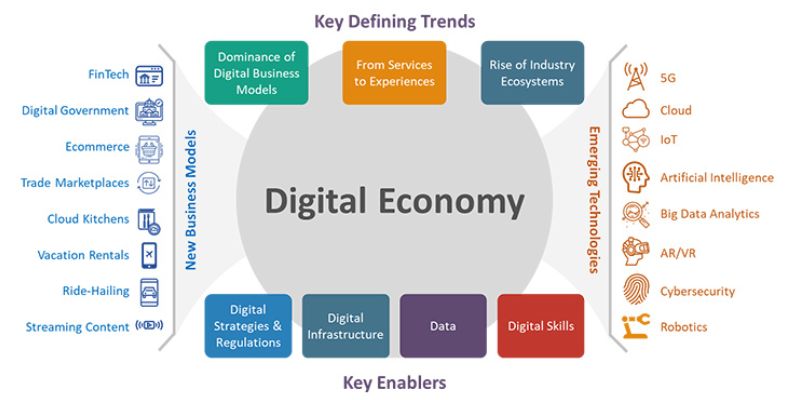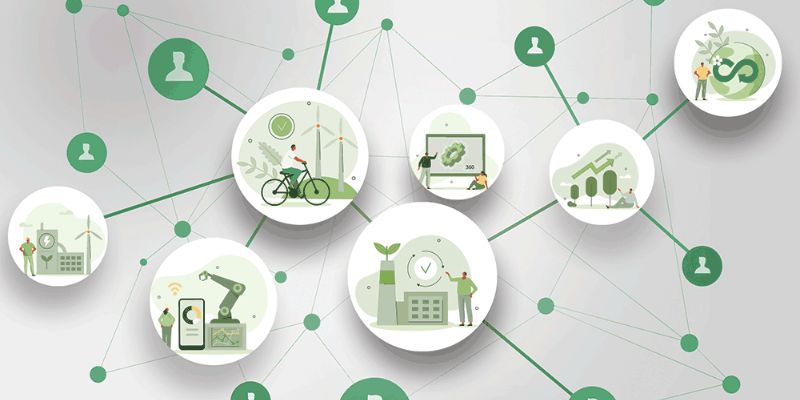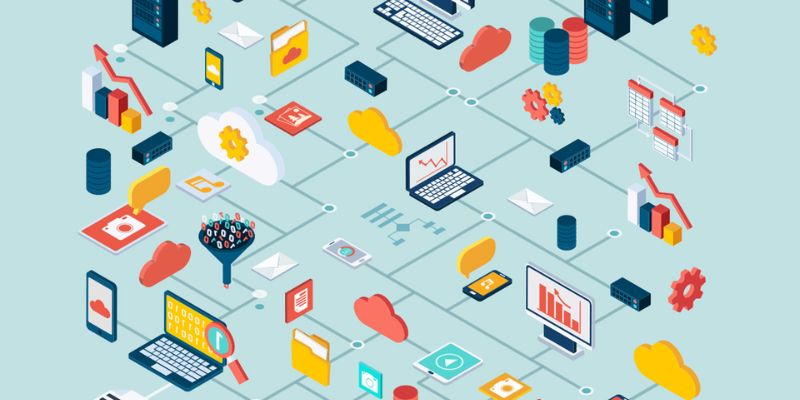Emerging Technologies: Unleashing the Potential of Digital Economy Giants
Dive right in to how emerging technologies for digital economy platforms are shaping our world. From blockchain’s sturdy grip on digital markets to AI’s smart tweaks in customer experiences, these advancements are giants waking up. They smooth out deals, open doors to digital cash in ways we only dreamed, and make shopping a dive into new worlds. Imagine buying a sofa just by glancing through your phone or finding exactly what you need with a digital nudge. And for the ones who love seeing the gears turn, there’s more – IoT and edge computing are making data zip and zoom for businesses. Get set; we’re unwrapping the future, layer by fascinating layer.
The Backbone of Digital Markets: Blockchain and Its Impact
Revamping Transactions with Smart Contracts
Smart contracts change how we deal with money and business. They are like deals set in code. If conditions are met, they act. No need for middlemen. This saves time and cash. They live on blockchain networks. These networks make sure everything is clear and no one cheats. The trust is in the code, a trust that was once in people.
New to smart contracts? Think of a vending machine. You pay the price, pick your snack, and get it. No store clerk needed. Smart contracts work much like this. They execute actions when certain rules are met. They’re big in real estate, law, and finance. They mark the beginning of self-running businesses. They can send money, share new stock, or keep records without error.
But smart contracts aren’t perfect. They need clear rules to work right. Bad code can lead to lost cash or data. We still need ways to handle mistakes or unexpected events in these contracts.
Decentralized Finance (DeFi): The New Era of Economic Platforms
DeFi stands for Decentralized Finance. It’s a big word for a simple idea: finance without the big players. Banks, brokers, and exchanges usually run the show. DeFi changes this. With DeFi, the power shifts to users through blockchain.
Instead of going through a bank, you do everything peer-to-peer. You can lend, trade, or save money. And you do it straight with someone else. All over the world. No fed. No big company fees. This sounds awesome, right? Yet, it’s not all smooth sailing.
DeFi is new, and with all new things comes risk. The tech is still growing. We don’t have all the answers or laws in place yet. This means people can lose money, just like in any wild west. But the chance to transform finance is huge! We now have a shot at a world where anyone can access money services. A shot where those without banks can join the global economy. This is a game-changer.
Blockchain and smart contracts lay the groundwork. They are the solid blocks on which digital economy giants stand. As an expert, I see how they lead to a fair and open market. One where your ideas can thrive without asking for nod from the old guard. Imagine, making deals, getting loans, and growing business—all on your terms. That’s the power of DeFi and blockchain. It’s why they’re the backbone of digital markets. It’s where big banks may take a back seat to blockchain’s transparent and fair system. It’s a shift to a place where the little guy has a voice, and anyone with a good idea can make it big.

Personalization and Efficiency: AI in the Digital Economy
Machine Learning: Tailoring Customer Experience
How does machine learning personalize shopping? It learns what you like. When you shop online, it shows you things you care about. Think of it like a smart friend who knows your style and only shows you clothes that look great on you. No more sifting through stuff you don’t like. It’s like magic, but it’s science. Machine learning looks at your past choices. Then, it predicts what you might want next. It gets better the more you use it.
Let’s dig deeper. Machine learning uses big data to get smarter. Every click, view, and purchase helps it learn. For example, if you often buy sneakers, machine learning suggests the latest sneaker trends for you. It can even tailor deals and discounts. You save time and money. Companies like Amazon use this to make shopping easy, fast, and fun. They spot patterns in your shopping. Then they help you find what you want.
AI-driven Customer Insights: Reshaping Market Strategies
Now, what are AI-driven customer insights? They’re clues about what customers want. AI looks at data from many shoppers. It then finds out what’s popular or needed. For businesses, this is like a treasure map. It guides them to make products that sell well. It helps them understand you better. When they know what you like, they can create better stuff for you. This makes everyone happy – you get cool products and companies make money.
To explain more, AI notices changes in what people buy. It spots new trends quickly. For example, if a new game goes viral, AI can tell companies to make more game gear. This means you get that awesome gaming chair you wanted. Or maybe there’s a fancy blender that everyone starts buying. AI tells stores to stock up on it. Then you find it easily when you go shopping. It works with everything – toys, clothes, even food. This way, the stores you visit are always up to date with what’s cool.
Companies like Netflix use AI to know what shows or movies you might enjoy. They look at what you’ve watched before. They find patterns, then suggest other titles you might like. This saves you time. You don’t have to search for what to watch next. It’s like your TV knows you and picks the perfect show.
Both machine learning and AI-driven insights make shopping and entertainment better for you. They’re smart tools that help companies give you a great experience. Always remember, behind every clever suggestion is a bunch of data and a smart system working for you. These AI pals are making the digital economy more personal and efficient, just for you.

Enhancing User Experience with Immersive Technologies
Augmented Reality in E-Commerce: A Closer Look at Products
Augmented reality (AR) is changing how we shop online. It lets us see items in our own space before we buy them. This is like trying on clothes without visiting a store. You pick a product and point your phone. AR puts the product in your room on the screen. Now, buying things online feels real and sure.
AR helps us make better choices when shopping. You see how a sofa fits in your living room. No more guessing or regret. This saves time and cuts down on returns. Stores benefit, too. Happy customers mean fewer costs from returns. AR in e-commerce is a game-changer!
Virtual Reality Shopping: The Future of Retail
Imagine shopping without leaving home but still walking through a store. This is what virtual reality (VR) shopping feels like. Put on a headset and enter a shop. You can look at items and pick them up, just like real life. VR gives you a cool new way to shop.
Companies are now building virtual stores. They say it’s the next big thing in retail. VR lets you choose products in a fun way. Also, it feels like a real store. You get the thrill of shopping from your couch. No lines, no waiting. Just fun!
Technology makes our shopping trips better and easier. With AR, you look at products in your space. VR makes you feel like you’re in a store. Both are great ways to buy what we need and enjoy doing it. The future of shopping? Bright and exciting!
The Infrastructure of Tomorrow: IoT and Edge Computing
IoT in Supply Chain: Real-time Transparency and Efficiency
In today’s world, getting stuff fast is what counts. Think about your last online order. You wanted to know where your package was every step of the way, right? Here’s how we make that happen. We use something called IoT, short for “Internet of Things”. It’s a bunch of gadgets and sensors working together. They track every move products make from warehouses to your doorstep.
IoT makes everything in supply chains clear as day. If something goes wrong, we see it right away. No secrets, no delays. That means companies can fix problems before you even know they’re there. Cool, huh? This tech makes sure your new shoes or your chocolate bars get to you on time. It keeps businesses running smooth and customers like you happy.
Fancy words for this are real-time transparency and efficiency. And it’s not just for packages. It’s used for food safety and keeping meds safe too. It’s big stuff and it’s getting bigger every day. IoT is helping humans like us make fewer mistakes. It’s making sure we get quality things without a long wait.

Edge Computing: Accelerating Data Processing for Digital Economic Growth
Now, let’s chat about edge computing. Imagine having a super-smart friend right next to you helping make quick choices. That’s what edge computing does. It puts brains (like computers) closer to things like cameras and sensors. This helps businesses make sense of info fast. And time is money, folks.
When you shop online, you want pages to load quick, right? Well, edge computing helps with that. It moves the data close to you, so there’s no more waiting. It’s like having a store’s computer at your place. Zip, zoom, done. It keeps sites moving fast, even if a million folks are online at the same time.
This tech is key for our growing digital world. It supports new ways of shopping, playing games, and lots more. It’s blazing the trail for what’s next in our fast-moving world. It’s all about giving us what we want, pronto. Edge computing is a game-changer, making sure the digital giants stay up to speed.
So, IoT keeps track of stuff and makes sure it gets to us fast and safe. Edge computing is the smart quick-thinker, making our online life smooth and fast. Together, these techs are building the groundwork for a shiny tomorrow. They’re setting the pace for a world where everything digital works like magic.
In this post, we explored big ideas in the digital market—blockchain, AI, immersive tech, and IoT. Smart contracts are changing how we handle deals. They’re quick and secure. DeFi is building a whole new finance world without banks. With AI, businesses can really know what you want. They use machine learning to make your online time better. Plus, they get smart tips from data to sell more.
VR and AR let you try things without leaving home. They’re changing shopping for good. With IoT, things talk to each other, making everything smooth and open. Edge computing means faster info, which is key for growing the digital economy.
All this tech is doing big things for how we buy, sell, and live. We looked at each piece and saw a future that’s smart and connected. This is where we’re headed, faster and smarter every day. So, here’s the final thought: we’re on an exciting ride, with tech as the driver. And you? You’re right here with the best seat to see it all happen.
Q&A :
What are the top emerging technologies shaping digital economy platforms?
Emerging technologies such as Artificial Intelligence, Machine Learning, Blockchain, and Internet of Things (IoT) are at the forefront of transforming digital economy platforms. These technologies allow for greater automation, improved data security, enhanced user experiences, and real-time data analytics, driving significant changes in how digital transactions are conducted.
How do Blockchain technologies impact digital economy platforms?
Blockchain technologies offer a decentralized and secure ledger system, which impacts digital economy platforms by increasing transparency, reducing the potential for fraud, and streamlining transaction processes. This can result in reduced costs for businesses and improved trust for consumers. Additionally, smart contracts can automate and enforce agreements without the need for intermediaries.
In what ways is Artificial Intelligence utilized in digital economy platforms?
Artificial Intelligence is utilized in several ways on digital economy platforms, including personalization of customer experiences, predictive analytics for market trends, automated customer service through chatbots, and optimization of logistics. AI helps platforms analyze vast amounts of data to make more informed decisions, enhance user engagement, and improve operational efficiencies.
What role does Big Data play in the growth of digital economy platforms?
Big Data plays a pivotal role in the growth of digital economy platforms by enabling data-driven decision-making. Through the analysis of large data sets, businesses can glean insights about consumer behaviors, market trends, and operational performance. This helps platforms offer tailored services, optimize marketing strategies, and anticipate market demands more accurately.
How are digital economy platforms integrating the Internet of Things (IoT)?
Digital economy platforms are integrating the Internet of Things (IoT) to enhance connectivity between devices and services. IoT allows for the collection of real-time data from various sensors and devices, which can be used to improve product offerings, enable predictive maintenance, and create a more interconnected service ecosystem. This integration can lead to new revenue streams and more personalized user experiences.

